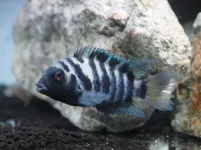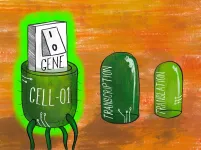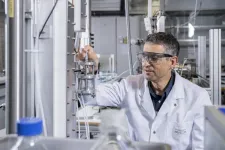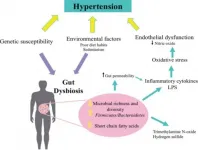Taking a look at the last millennium shows: Droughts in Germany could become more extreme
2021-03-19
(Press-News.org) In the future, droughts could be even more severe than those that struck parts of Germany in 2018. An analysis of climate data from the last millennium shows that several factors have to coincide to produce a megadrought: not only rising temperatures, but also the amount of solar radiation, as well as certain meteorological and ocean-circulation conditions in the North Atlantic, like those expected to arise in the future. A group of researchers led by the Alfred Wegener Institute have just released their findings in the journal Communications Earth & Environment.
Despite the precipitation this winter, which in some cases was considerable, many parts of Germany still haven't recovered from the past three, extremely dry years; the forests and other vegetation are suffering as a result. Some have speculated that 2018 was the driest year in modern history. Yet a look at the climate data from the last millennium shows that this "record-breaking" year, just like the extremely dry years 2003 and 2015, was within the limits of natural variability. There were periods of extreme drought between the years 1400 and 1480, and between 1770 and 1840. However, they affected very different landscapes, with a much higher percentage of natural mixed forests, riparian zones and wetlands.
"We have to be prepared for the fact that, because of climate change, in the future Germany might experience extreme droughts that do enormous damage to our modern agriculture and forestry," says Dr Monica Ionita-Scholz from the Alfred Wegener Institute, Helmholtz Centre for Polar and Marine Research (AWI). She and her team analysed historical data from the last millennium in order to reconstruct droughts. "In our study, for the first time we sought to identify the driving factors for droughts in Central Europe in the last millennium," the climate expert explains. To do so, they used e.g. historical records on temperature, precipitation and the water levels in rivers, and analysed currents in the North Atlantic and atmospheric pressure patterns - two key factors that determine the weather. The study's conclusion: there have repeatedly been megadroughts in Central Europe, whenever several factors coincided. The periods of extreme drought in the last millennium were characterised by a weak or negative phase of the Atlantic Multidecadal Oscillation, reduced solar radiation, and frequently occurring, stable atmospheric pressure systems over the central North Atlantic and North Sea.
"Right now, most forecasts for future drought scenarios are concentrating on the rising temperatures produced by anthropogenic climate change, together with aridity due to pronounced evaporation," says Ionita-Scholz. "But if we want to prepare for the future, it's imperative that we also take into account further natural and anthropogenic factors in our calculations." The general consensus of the scientific community is that ocean circulation in the North Atlantic will likely weaken. If this comes to pass, and there is also a phase of reduced solar activity due to natural variability, the result could be decades-long megadroughts like those experienced in the last millennium - posing tremendous social and political challenges.
INFORMATION:
Original publication:
M. Ionita, M. Dima, V. Nagavciuc, P. Scholz and G. Lohmann: Past megadroughts in central Europe were longer, more severe and less warm than modern droughts. Communications Earth & Environment (2021); DOI: 10.1038/s43247-021-00130-w
ELSE PRESS RELEASES FROM THIS DATE:
2021-03-19
Large areas of forests regrowing in the Amazon to help reduce carbon dioxide in the atmosphere, are being limited by climate and human activity.
The forests, which naturally regrow on land previously deforested for agriculture and now abandoned, are developing at different speeds. Researchers at the University of Bristol have found a link between slower tree-growth and land previously scorched by fire.
The findings were published today [date] in Nature Communications, and suggest a need for a better protection of these forests if they are to help mitigate the effects of climate change.
Global forests are expected to contribute a quarter of pledged mitigation under the ...
2021-03-19
OSAKA, Japan. If you were given the option to eat a delicious meal by yourself, or share that meal with your loved ones, you would need as very good excuse ready if you chose the former. Turns out, fish share a similar inclination to look after each other.
For the first time ever, a research group led by researcher Shun Satoh and Masanori Kohda, professor of the Graduate School of Science, Osaka City University, have shown these altruistic tendencies in fish through a series of prosocial choice tasks (PCT) where they gave male convict cichlid fish two choices: the antisocial option of receiving food for themselves alone and the prosocial option of receiving food for themselves and their partner.
"As a result, it can be said that the convict cichlid ...
2021-03-19
In a recent study led by the University of Bristol, scientists have shown how to simultaneously harness multiple forms of regulation in living cells to strictly control gene expression and open new avenues for improved biotechnologies.
Engineered microbes are increasingly being used to enable the sustainable and clean production of chemicals, medicines and much more. To make this possible, bioengineers must control when specific sets of genes are turned on and off to allow for careful regulation of the biochemical processes involved.
Their findings are reported today in the journal Nature Communications.
Veronica Greco, lead author ...
2021-03-19
Scientists have discovered in more detail than ever before how the human body's immune system reacts to malaria and sickle cell disease.
The researchers from the universities of Aberdeen, Edinburgh, Exeter and Imperial College, London have published their findings in Nature Communications.
Every year there are ~200 million cases of malaria, which causes ~400,000 deaths.
As it causes resistance against malaria, the sickle cell disease mutation has spread widely, especially in people from Africa.
But if a child inherits a double dose of the gene - from both mother and father - they will develop ...
2021-03-19
Researchers at the Paul Scherrer Institute PSI have for the first time observed photochemical processes inside the smallest particles in the air. In doing so, they discovered that additional oxygen radicals that can be harmful to human health are formed in these aerosols under everyday conditions. They report on their results today in the journal Nature Communications.
It is well known that airborne particulate matter can pose a danger to human health. The particles, with a maximum diameter of ten micrometres, can penetrate deep into lung tissue and settle ...
2021-03-19
Sabrina L. Spencer, PhD, is a CU Boulder researcher and a CU Cancer Center member. Spencer recently won two awards: the Damon Runyon-Rachleff Innovation Award (from the Damon Runyon Cancer Research Foundation) and the Emerging Leader Award (from The Mark Foundation for Cancer Research). The preliminary research she used to apply for the grants, "Melanoma subpopulations that rapidly escape MAPK pathway inhibition incur DNA damage and rely on stress signalling," was published in Nature Communications on March 19, 2021. We spoke to Spencer about the awards and how she plans to use them to ...
2021-03-19
Researchers looking at miniscule levels of plutonium pollution in our soils have made a breakthrough which could help inform future 'clean up' operations on land around nuclear power plants, saving time and money.
Publishing in the journal Nature Communications, researchers show how they have measured the previously 'unmeasurable' and taken a step forward in differentiating between local and global sources of plutonium pollution in the soil.
By identifying the isotopic 'fingerprint' of trace-level quantities of plutonium in the soil which matched the ...
2021-03-19
A study of Japanese university students and recent graduates has revealed that writing on physical paper can lead to more brain activity when remembering the information an hour later. Researchers say that the unique, complex, spatial and tactile information associated with writing by hand on physical paper is likely what leads to improved memory.
"Actually, paper is more advanced and useful compared to electronic documents because paper contains more one-of-a-kind information for stronger memory recall," said Professor Kuniyoshi L. Sakai, a neuroscientist at the University of Tokyo and corresponding author of the research recently published in Frontiers in Behavioral Neuroscience. The research was completed with collaborators from the NTT Data Institute of Management Consulting.
Contrary ...
2021-03-19
Philadelphia, March 19, 2021 - In recent years, fermented dairy foods have been gaining attention for their health benefits, and a new review published in the Journal of Dairy Science indicates these foods could help reduce conditions like hypertension (high blood pressure). A team of investigators from the Center for Food Research and Development in Sonora, Mexico, and the National Technological Institute of Mexico in Veracruz reports on numerous studies of fermented milks as antihypertensive treatments and in relation to gut microbiota modulation. They also examine the potential mechanistic pathways of gut modulation through antihypertensive fermented milks.
In addition to the impact of genetics and the environment, there is growing ...
2021-03-19
During the first six months of the pandemic, as people attempted to stay away from hospitals caring for those sick with COVID-19, potentially avoidable hospitalizations for non-COVID-19-related conditions fell far more among white patients than Black patients, according to a new study that looked at admissions to UCLA Health hospitals.
The findings indicate that the COVID-19 crisis has exacerbated existing racial health care disparities and suggest that during the pandemic, African Americans may have had worse access than whites to outpatient care that could have helped prevent deterioration of their non-COVID-19 health conditions, said Dr. ...
LAST 30 PRESS RELEASES:
[Press-News.org] Taking a look at the last millennium shows: Droughts in Germany could become more extreme





